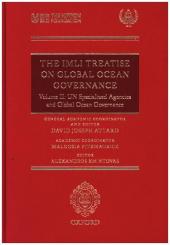 Neuerscheinungen 2018Stand: 2020-02-01 |
Schnellsuche
ISBN/Stichwort/Autor
|
Herderstraße 10
10625 Berlin
Tel.: 030 315 714 16
Fax 030 315 714 14
info@buchspektrum.de |

David Attard, Malgosia Fitzmaurice, Alexandros Ntovas
(Beteiligte)
The IMLI Treatise On Global Ocean Governance
Volume II: UN Specialized Agencies and Global Ocean Governance
Herausgegeben von Fitzmaurice, Malgosia; Ntovas, Alexandros; Mitarbeit: Attard, David
2018. 432 S. 249 mm
Verlag/Jahr: OXFORD UNIVERSITY PRESS; OUP OXFORD 2018
ISBN: 0-19-882396-7 (0198823967)
Neue ISBN: 978-0-19-882396-4 (9780198823964)
Preis und Lieferzeit: Bitte klicken
The future of our oceans relies on an expansive legal framework. This second volume in a three part series considers autonomous organizations working inside the remit of the UN: are they ensuring sustainable development, are efforts adequately administrated, and how much co-ordination is there between different legal bodies?
The 1982 United Nations Convention on the Law of the Sea (UNCLOS) remains the cornerstone of global ocean governance. However, it lacks effective provisions or mechanisms to ensure that all ocean space and related problems are dealt with holistically. With seemingly no opportunity for revision due to the Conventions burdensome amendment provisions, complementary mechanisms dealing with such aspects of global ocean governance including maritime transport, fisheries,
and marine environmental sustainability, have been developed under the aegis of the United Nations and other relevant international organizations. This approach is inherently fragmented and unable to achieve sustainable global ocean governance. In light of the Sustainable Development Goals (SDGs),
particularly Goal 14, the IMLI Treatise proposes a new paradigm on the basis of integrated and cross-sectoral approach in order to realise a more effective and sustainable governance regime for the oceans.
This volume focuses on the role of the UN Specialized Agencies towards the development of effective and sustainable ocean governance by looking at the more elaborate mechanisms they developed in order to achieve the desired objectives laid down in UNCLOS. From FAO to UNODC, the volume examines how they ensure sustainable development and how much coordination exists among them.


